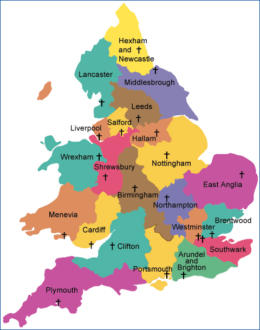The Catholic Education Service of England and Wales (CESEW) acts on behalf of the Catholic Bishops’ Conference of England and Wales to secure and promote Catholic education.
There are more than 2,200 Catholic schools, academies and colleges in England and Wales. Before 2010, the majority of Catholic schools in England were voluntary aided, but since then many have converted to academy status.
There are 22 dioceses in England and Wales. Each diocese has an education board or service, which supports the schools in delivering Catholic education. The diocese is not an employer of teaching staff. In voluntary-aided schools, the employer is the governing body, and in academies or multi-academy trusts (MATs), the employer is the academy trust.
Diocesan academy trusts
Recently, larger Catholic academy trusts based around a diocese have been formed, which include all the schools in the diocese. For example, the Plymouth CAST trust includes all the Catholic schools in the Plymouth diocese. The Nottingham diocese has divided all its schools into four trusts. In these cases, all the schools in the diocese have become academies.
The decision on whether to create such a trust lies with the bishop. The Department for Education (DfE) has incentivised the creation of larger MATs with over 3,000 pupils by allowing them to secure capital funding without the Church paying 10% towards capital projects, which is required for voluntary-aided schools.
Larger Catholic MATs may cross local authorities and NASUWT regions. For example, the Archdiocese of Birmingham crosses two NASUWT regions as it includes Oxfordshire. Catholic MATs or single academy trusts which were formed in the early stages of the academies programme have been amalgamated into larger MATs, which include the remaining voluntary-aided schools.
CESEW employment documents
The CESEW consults on contracts and policies which Catholic schools and academies are expected to adopt. These are all available on its website: Employment Documents (catholiceducation.org.uk).
CESEW contracts
Catholic contracts are based on the School Teachers’ Pay and Conditions Document (STPCD); however, they have additional requirements around the Catholic ethos and character of the school. There are some roles in Catholic schools which can only be filled by a practising Catholic; for example, the headteacher, the deputy headteacher and the head of religious education.
The current contract allows for a probationary period, but this is discretionary. The NASUWT has made clear its objection to probationary periods for teachers, particularly as they sit outside the provisions of the Burgundy Book, which governs the conditions of service for teachers in England and Wales.
CESEW policies
The CESEW provides five policies which affect teachers in schools: Appraisal, Capability, Grievance, Disciplinary, and Managing Attendance. In 2020, changes to the first four of those policies were consulted on, and the Managing Attendance policy will undergo consultation this term (Spring 2021). The NASUWT has not agreed any of these policies. The CESEW is not an employer; therefore, the model policies require local consultation with the academy trust or the governing body of a voluntary-aided school.
Wales
The CESEW produces a set of model policies and contracts for Wales, which include some significant differences as they must adhere to Welsh Government guidance. There are no academies in Wales, therefore all consultation should take place with voluntary-aided schools through their HR advisors.
How should consultation take place?
The CESEW advises that consultation should take place with the school/academy HR advisor and that changes are referred to the diocese for approval. The way in which consultations take place is not specified in the CESEW guidance. The NASUWT’s view is that consultation should be meaningful; for example, the policies should be sent to the appropriate NASUWT Representatives four to six weeks in advance of meetings, to discuss amendments in order that the policies meet NASUWT checklists, and are not detrimental to our members.
Trade Union Recognition Agreements (TURAs)
Each academy trust is an individual employer, and therefore it is necessary to negotiate a TURA with each trust. Catholic social teaching advises that workers have a basic right to be a member of a union and take part in union activity. The model Trades Union Congress (TUC) TURA should be used as a basis for a TURA with Catholic MATs (which can be found at: https://www.nasuwt.org.uk/advice/academies.html). Voluntary-aided schools pay into facilities through the local authority and are therefore included in recognition agreements with the local authority.
Coronavirus
The NASUWT Coronavirus Advice Hub is updated daily with the issues raised by our members including the latest advice on arrangements for Remote Learning and Checklists for Workload and Health and Safety. It is available at: www.nasuwt.org.uk/Coronavirus.

Catholic dioceses of England and Wales - click for larger image
